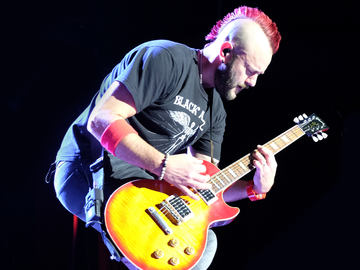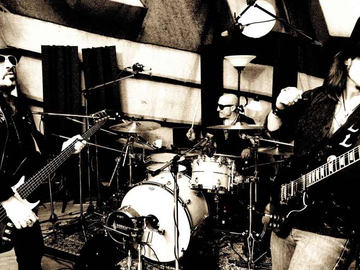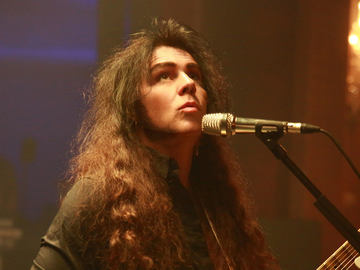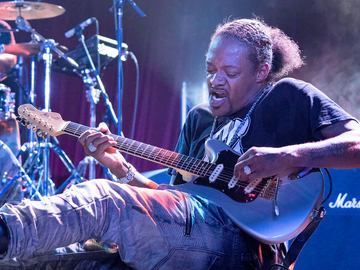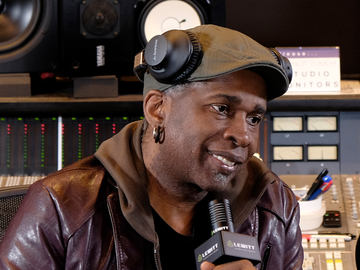Derek Day
"The MTP 550 defines my vocal sound and gives my voice more definition."

23 year-old Derek Day is already a guitar slinger to be reckoned with and a powerhouse vocalist. Steve Vai saw a video of Derek performing on Santa Monica’s Third Street Promenade and sensed a spark of magic that inspired him to say, “This guy has a nice fire in him … he’s got powerful charisma.” Vai then invited the wild, young pop/rock performer to open for him in concert. From there, Derek hit the road and toured with classic legends like Ted Nugent and Living Colour, and he’ll be touring again this summer with an act to be announced soon. In addition to his three-piece band, which is his solo project, Derek is the lead singer for Classless Act, with London Hudson (Slash’s son) on drums, Nico Tsangaris on lead guitar, Dane Pieper on rhythm guitar, and Franco Gravante on bass.
[LEWITT] What kind of experience has your career been for you so far?
I’d say pretty intense. You know, I started out busking on the street back when I was thirteen, and now both bands are playing sold-out shows and touring across the country. It’s very fun and it’s also a lot of work. But I’ve been blessed and fortunate, because the hard work has paid off and more and more opportunities are coming up – it’s kind of snowballing a bit, which is really cool. Luckily, I’m surrounded by great musicians. Los Angeles is full of fantastic musicians, you know, but only a handful of them are good people too … and luckily, I’ve got this handful. So it’s just been fantastic.
[LEWITT] In your solo project, you play guitar and sing lead vocals, but in Classless Act you just sing: How does that feel, not having the guitar in your hands?
It’s a little tricky. There’s no nervousness, because just being on the stage and singing is my favorite thing to do. But it is a challenge, because the guitar is a good shield and you just look so cool with the guitar. Just singing, you have these moments – during solos or instrumental sections – where it gets tricky. Which is cool, though, because then I’m forced to think on the spot and kind of figure out what’s going on and feel the music, listening to things and trying to make more contact with the audience. It’s definitely a challenge.
[LEWITT] How do you get yourself in shape to be able to sing every night without throwing out your voice? Are you taking voice lessons or do you do special warm ups?
Actually, that’s funny … a friend of mine who’s going on tour just asked me the same question today.
First at all, I should be eating a lot healthier – but what I actually like to do is short, 3-mile runs from time to time, which really expands my lungs. And on top of that, of course, I warm up for around 10 minutes before the show and after eating, and I try not to eat right before the show – otherwise I’d be coughing it up. Actually, if I have a show at 9 p.m., I’ll try not to eat after 2 p.m. But I do eat a lot, because you’ve got to have the power and the energy and stay like a little bit hungry and then warm up for about 10 minutes. I start out with falsettos, and then I start testing my chest voice – which is just doing this higher range like big yells, but very slow, nice, and easy. And after the show, I spend around 5 minutes warming down – just light head voice stuff. It’s rather annoying, and of course I don’t drink or smoke before the show and try to just keep my voice nice and healthy. I learned these vocal drills from my friend Debby Holiday – an amazing singer – and I’ve also heard stuff from other fantastic singers like Patrick from Budderside and Corey Glover from Living Colour, so I’ve kind of learned a bunch of things from these awesome cool cats.
[LEWITT] Have you had any bad vocal experiences on stage from eating too late before a show?
[Derek Day] That’s a nightmare! There was a time – you know, I always have a cup on stage, just in case – but the main problem with eating is that I’d simply cough up whatever I had, even if it was 5 hours before. Sometimes even the littlest thing: I’d just cough it up, and my voice was clouded over and I couldn’t finish the set. It took me years to realize that.
[LEWITT] So now you’re on tour with two bands and you’re using the MTP 550 DM: Can you tell us a little bit about your experiences with that mic?
[Derek Day] My voice is already pretty trebly to being with, ’cause of the high notes I go for – I’m usually a high e-flat guy. I’ve already A/B’d the MTP 550 DM in several venues with the SM 58. What the MTP 550 actually does is make my high-end shinier. The MTP 550 defines my vocal sound and gives my voice more definition – it kind of makes it stand out more. So the mic is usually a little bit clearer than the SM 58, and that’s the main thing I’ve noticed about it. I’ve used it at least 20 times within the last two months – outdoors and indoors – and it works really well in different environments and makes my high-end sound really nice. I like to sing higher stuff, and at the same time I like to sing gritty stuff – and with most mics, it would all sound muddy, especially with the gain all the way up on the guitars and bass and a guy bashing the drums. Somehow, the MTP 550 DM keeps it all clean and defined.
[LEWITT] Have other musicians or sound engineers commented on the sound of the MTP 550 DM?
[Derek Day] Several times, but actually more the sound people than the musicians. When I’ve played outdoors, some people have said, “It sounded very good, what mic do you use?” But actually, it’s the sound engineers who’ve been quite interested in the mic, because they’re used to the SM 58 and I had to A/B the MTP 550 DM with their SM 58’s again and again – and in the end, the sound engineers always said: “Dude, I actually like the MTP 550 DM better – it sounds crisper.” So the sound people tend to tell me that, and I think they know most of the mics out there.
